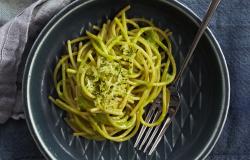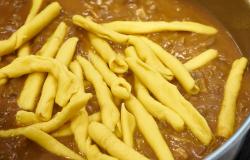Sicilian Pesto

For a traditional 'pesto alla trapanese' the ingredients have to be crushed using a wooden pestle and marble mortar, just like for a Pesto alla Genovese.
Wash the basil in cold water and set aside to dry on a towel. Prepare the tomatoes, rinse them and using a sharp knife, slice a shallow X into the bottom of the tomato (opposite the stem side). Then drop them gently into a pot with boiling water for 20-25 seconds and then place in cold water before peeling them and removing the seeds.
In the mortar, crush the cloves of garlic with a few grains of salt until the garlic has softened. Begin adding the basil leaves (but don't add all at once!). The essential oils of basil are stored in the veins of the leaves. Use a gentle circular motion, slowly crush the basil by moving the pestle around the edges of the mortar. When you notice a bright green liquid being drawn from the leaves, it is time to add the almonds. Once softened, add the chopped tomatoes, and finally the olive oil in a very thin stream. If you would like your pesto hot, just add some chili to it.
Preparation should take place at room temperature and the sauce should be served immediately to avoid oxidation. So pour it over the pasta, possibly busiate, linguine or spaghetti, serve with a sprinkle of pecorino cheese and enjoy!
*Notice that if you do not want to use a mortar, you can obtain good results using a food processor instead. Add all the ingredients and turn the food processor on; with the motor running, add the olive oil in a thin stream through the funnel in the lid.
*Another version of this pesto: instead of adding the tomatoes to the mortar and crush them with the other ingredients, just dice the tomatoes and mix in the almond and basil pesto, just before adding the pasta.
Sicilian Pesto goes great with a type of spiral-shaped pasta called busiate. Busiate and other Italian treats are available in our 'L'Italia in Cucina' Christmas box, which makes for a perfect gift for a loved one, or, why not, yourself!






